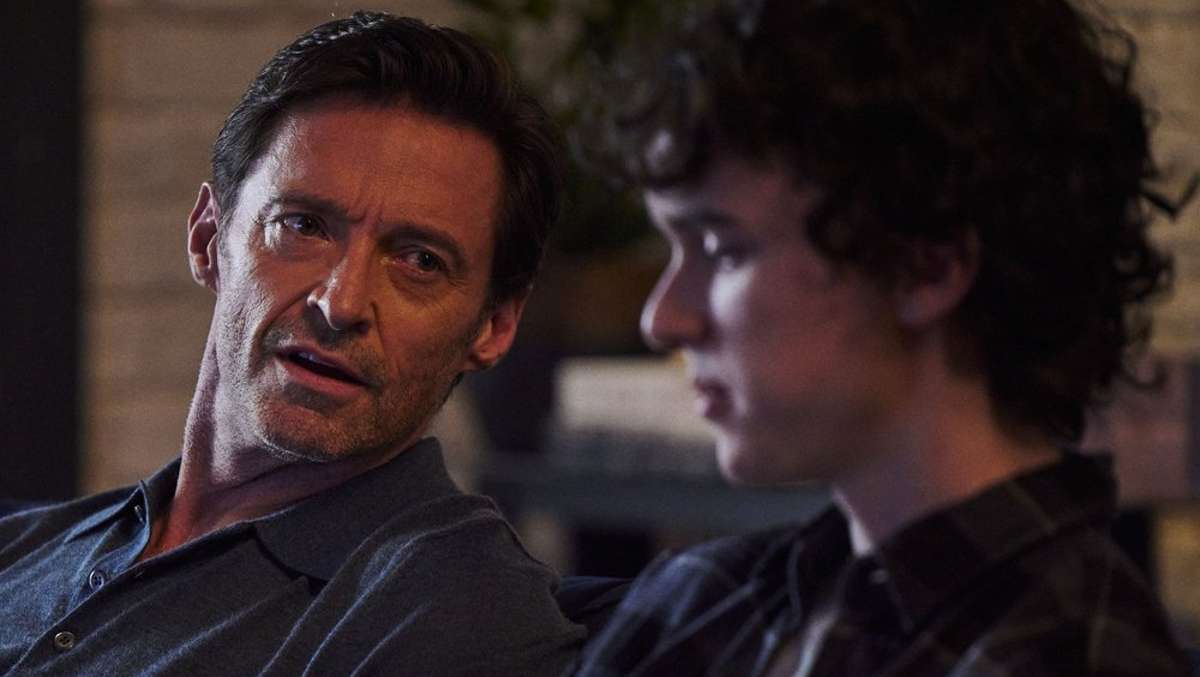| Worth seeing: | as a disappointing follow-up to Florian Zeller's sublime The Father, which turns mental health into a puzzle with no solution and a drama with no point |

| Director: | Florian Zeller |
| Featuring: | Hugh Jackman, Zen McGrath, Anthony Hopkins, Hugh Quarshie, Laura Dern, Vanessa Kirby, William Hope |
| Length: | 123 minutes |
| Certificate: | 15 |
| Country: | France, UK |
| Released: | 17th February 2023 |
WHAT’S IT ABOUT?
Everything is going well for New York lawyer, Peter (Hugh Jackman). He and his second wife Beth (Vanessa Kirby) have just had a baby and he’s about to embark on a career in politics.
But everything is thrown into doubt with Nicholas (Zen McGrath), his teenaged son from his first marriage to Kate (Laura Dern), turns up on his doorstep, begging to move in with him.
Nicholas has been skipping school, has little social life and has been self-harming to relieve his depression.
Peter sets him up with a new school and is relieved to hear that things seem to have turned around. But things aren’t always what they seem.
WHAT’S IT LIKE?
The last time we heard from writer-director Florian Zeller was two years ago, when he won an Oscar for his sublime film adaptation of his own play The Father, as Sir Anthony Hopkins also collected an Academy Award for his portrayal of an elderly man with dementia.
So The Son is a film that comes with provenance – there’s a lot to live up to. Hugh Jackman, Laura Dern and Vanessa Kirby all come with a history of Oscar recognition, and their performances live up to expectation – particularly Jackman’s determination to make up for lost love. Relative newcomer Zen McGrath, in the titular role, is also effective enough in his portrayal of a troubled teen.
But while there’s much to praise about this film – as Nicholas plays his parents off against one another and plays emotional games with his step-mother – the overall narrative feels weak this time.
While The Father is all about getting inside the tortured and tangled mind of the protagonist, The Son is more about the parents, leaving the motivation and true wellbeing of the central character as a bit of a mystery by until the end.
Rather than playing like a drama, then, this film feels more like a puzzle – but without any coherent pieces to put together, it leaves a somewhat murky picture for the viewers to try to decode. A series of flashbacks – all of the same childhood event – add little to our understanding of the past or the present.
The more interesting father-son relationship is between Jackman’s Peter and his own father – a cameo from Hopkins, in a scene-stealing role as chilling as his first Oscar-winning turn in The Silence of the Lambs, more than three decades ago. He hasn’t been this terrifying for years.
Peter wants his father to know that he is a different kind of father to him – a warmer, kinder, more supportive father – but the kicker is that at the end of the film, viewers might be left wondering whether being a better father is actually better for the son at all. All of which family dynamics make for a complex and challenging examination of family relations.
But while the issue at its heart – mental health and specifically the mental health of teenagers – is important to understand, the rather nihilistic conclusion seems to be that you can’t really understand it and you can’t really do much about it and that doctors will probably have a better shot at doing both than laymen – which is probably exactly what everyone would think at the start of the film anyway. Perhaps the only lesson to be taken away is never to trust the word of someone who’s displayed signs of depression, but that would be to suggest that no sufferer ever gets the condition until control.
Peter’s relationship with Nicholas recalls the dynamic between Steve Carell and his son Timothée Chalamet in the similarly futile Beautiful Boy.
All of which just makes you question whether there’s any point to this film at all, other than to showcase some strong performances by rehearsing familiar examples of dysfunctional family life, without really making much of an effort to teach us anything. It feels like a considered effort to follow up on Zeller’s Oscar success with The Father – it even launched at the Venice Film Festival – but among the higher profile ceremonies, only the somewhat questionable Golden Globes included The Son on their shortlist.
And a coda to the story, clearly intended as another attempt to get your mind ticking, won’t fool anyone – if anything, it’s a cynical move to get the audience to wrestle further with the themes of hope and hopelessness. Perhaps Zeller is thinking that he can toy with us in the same way that his eponymous Son toys with his parents, but the audience won’t like being played with anymore than Nicholas’ parents do.
